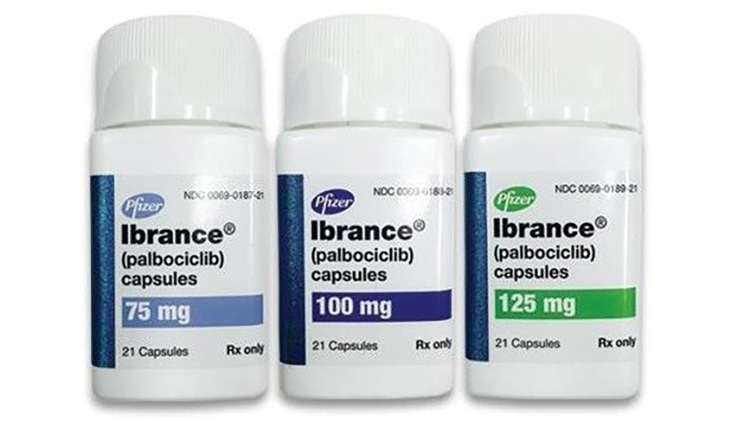Keytruda (pembrolizumab) vs Ibrance (palbociclib)
Keytruda (pembrolizumab) vs Ibrance (palbociclib)
Keytruda (pembrolizumab) is an immunotherapy drug that works by helping the immune system to detect and fight cancer cells, commonly used in various types of cancers including melanoma, lung cancer, and head and neck cancers. Ibrance (palbociclib), on the other hand, is a targeted therapy that specifically inhibits certain proteins (CDK4 and CDK6) involved in the proliferation of cancer cells, and is primarily used in the treatment of HR-positive, HER2-negative breast cancer. The choice between Keytruda and Ibrance would depend on the specific type of cancer a patient has, as they target different pathways and are approved for different indications; therefore, a healthcare provider would recommend the appropriate medication based on the patient's individual diagnosis and treatment plan.
Difference between Keytruda and Ibrance
| Metric | Keytruda (pembrolizumab) | Ibrance (palbociclib) |
|---|---|---|
| Generic name | Pembrolizumab | Palbociclib |
| Indications | Various types of cancers including melanoma, lung cancer, head and neck cancer, Hodgkin lymphoma, and others | HR-positive, HER2-negative breast cancer in combination with specific endocrine therapies |
| Mechanism of action | Programmed death receptor-1 (PD-1) blocking antibody, which helps the immune system to attack cancer cells | Cyclin-dependent kinase 4/6 (CDK4/6) inhibitor, which prevents cancer cells from dividing and growing |
| Brand names | Keytruda | Ibrance |
| Administrative route | Injection (Intravenous) | Oral (Capsule/Tablet) |
| Side effects | Fatigue, musculoskeletal pain, decreased appetite, itching, diarrhea, nausea, rash, fever, cough, shortness of breath, constipation, pain in extremities, and others | Neutropenia, leukopenia, infections, fatigue, nausea, anemia, stomatitis, alopecia, diarrhea, thrombocytopenia, and others |
| Contraindications | Individuals with hypersensitivity to pembrolizumab or any of its excipients | Individuals with hypersensitivity to palbociclib or any of its excipients, severe hepatic impairment |
| Drug class | Anti-PD-1 monoclonal antibody | CDK4/6 inhibitor |
| Manufacturer | Merck & Co. | Pfizer |
Efficacy
Keytruda (Pembrolizumab) Efficacy in Breast Cancer
Keytruda, generically known as pembrolizumab, is a monoclonal antibody that has shown efficacy in treating certain types of breast cancer. It works by targeting the programmed death receptor-1 (PD-1) pathway, which is a mechanism that cancer cells can exploit to evade the immune system. By inhibiting this pathway, Keytruda can enhance the body's immune response against cancer cells. It is particularly effective in breast cancers that express high levels of PD-L1, which is a ligand for PD-1. In clinical trials, Keytruda has demonstrated improved progression-free survival in patients with PD-L1 positive, advanced triple-negative breast cancer when combined with chemotherapy.
However, the efficacy of Keytruda can vary based on the subtype of breast cancer and the presence of specific biomarkers. For instance, its use is more established in triple-negative breast cancer (TNBC), which lacks the expression of estrogen and progesterone receptors and does not overexpress HER2. In this subset of breast cancer, Keytruda has been approved for use in combination with chemotherapy as a first-line treatment for unresectable or metastatic disease, based on the results of clinical studies showing a significant benefit in overall survival and progression-free survival for these patients.
Ibrance (Palbociclib) Efficacy in Breast Cancer
Ibrance, or palbociclib, is an oral medication used to treat certain types of breast cancer. It is a selective inhibitor of cyclin-dependent kinases 4 and 6 (CDK4/6), which are enzymes that regulate cell division. By inhibiting these kinases, Ibrance can slow the progression of cancer by preventing cancer cells from dividing and growing. It is primarily used in combination with hormonal therapies to treat hormone receptor-positive (HR+), human epidermal growth factor receptor 2-negative (HER2-) advanced or metastatic breast cancer. In clinical trials, Ibrance has shown a significant improvement in progression-free survival compared to hormonal therapy alone.
The efficacy of Ibrance is most pronounced in patients with HR+ and HER2- breast cancer, which is the most common subtype. It is approved for use in both premenopausal and postmenopausal women, often in combination with an aromatase inhibitor or fulvestrant. The addition of Ibrance to standard endocrine therapy has been a significant advancement in the treatment of this breast cancer subtype, leading to prolonged disease control and potentially delaying the need for chemotherapy. However, it is important to note that while Ibrance has improved progression-free survival, an increase in overall survival has been more challenging to demonstrate, and research is ongoing to better understand its long-term benefits.
Regulatory Agency Approvals
Keytruda
-
European Medical Agency (EMA), European Union

-
Food and Drug Administration (FDA), USA

-
Health Canada

-
Therapeutic Goods Administration (TGA), Australia

-
Medsafe (NZ)

Ibrance
-
European Medical Agency (EMA), European Union

-
Food and Drug Administration (FDA), USA

-
Health Canada

-
Therapeutic Goods Administration (TGA), Australia

-
Medsafe (NZ)

Access Keytruda or Ibrance today
If Keytruda or Ibrance are not approved or available in your country (e.g. due to supply issues), you can access them via Everyone.org.
How it works

Make an enquiry
Choose the medicine you want to buy, answer a couple of questions, and upload your prescription to speed things up. We’ll get back to you within 24 hours.


Make an enquiry
Choose the medicine you want to buy, answer a couple of questions, and upload your prescription to speed things up. We’ll get back to you within 24 hours.


Breeze through the paperwork
We'll guide you through the required documents for importing unapproved medicine, ensuring you have all the necessary information.


Get a personalized quote
We’ll prepare a quote for you, including medicine costs and any shipping, administrative, or import fees that may apply.


Receive your medicine
Accept the quote and we’ll handle the rest - sourcing and safely delivering your medicine.

Some text on this page has been automatically generated. Speak to your physician before you start a new treatment or medication.
Let's talk
If you have any questions, call us or send us a message through WhatsApp or email:
Contact us




